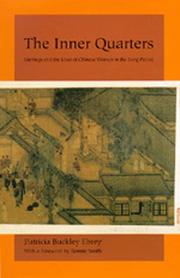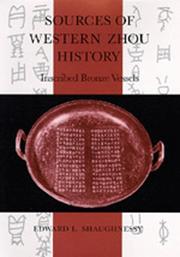| Listing 1 - 3 of 3 |
Sort by
|

ISBN: 0520913485 0585104344 9780520913486 9780585104348 9780520081567 9780520081581 0520081560 0520081587 Year: 1993 Publisher: Berkeley, CA : University of California Press,
Abstract | Keywords | Export | Availability | Bookmark
 Loading...
Loading...Choose an application
- Reference Manager
- EndNote
- RefWorks (Direct export to RefWorks)
The Sung Dynasty (960-1279) was a paradoxical era for Chinese women. This was a time when footbinding spread, and Confucian scholars began to insist that it was better for a widow to starve than to remarry. Yet there were also improvements in women's status in marriage and property rights. In this thoroughly original work, one of the most respected scholars of premodern China brings to life what it was like to be a woman in Sung times, from having a marriage arranged, serving parents-in-law, rearing children, and coping with concubines, to deciding what to do if widowed. Focusing on marriage, Patricia Buckley Ebrey views family life from the perspective of women. She argues that the ideas, attitudes, and practices that constituted marriage shaped women's lives, providing the context in which they could interpret the opportunities open to them, negotiate their relationships with others, and accommodate or resist those around them. Ebrey questions whether women's situations actually deteriorated in the Sung, linking their experiences to widespread social, political, economic, and cultural changes of this period. She draws from advice books, biographies, government documents, and medical treatises to show that although the family continued to be patrilineal and patriarchal, women found ways to exert their power and authority. No other book explores the history of women in pre-twentieth-century China with such energy and depth.
Marriage --- Women --- Sociology & Social History --- Social Sciences --- Family & Marriage --- History. --- Social conditions. --- History --- Social conditions --- China --- History of Asia --- anno 900-999 --- anno 1000-1099 --- anno 1100-1199 --- anno 1200-1299 --- 20th century. --- academic. --- advice. --- arranged marriage. --- biography. --- chinese dynasty. --- chinese women. --- concubines. --- culture. --- dynastic. --- economics. --- feminism. --- feminist. --- footbinding. --- gender studies. --- government. --- marriage. --- medical. --- patriarchal. --- patriarchy. --- politics. --- premodern china. --- property rights. --- raising children. --- relationships. --- scholarly. --- sung dynasty. --- true story. --- widow. --- women in china. --- womens issues. --- womens rights. --- womens studies. --- world history.
Book
ISBN: 9780691177465 9780691228976 0691228973 9780691201955 0691201951 0691177465 Year: 2020 Publisher: Princeton Princeton University Press
Abstract | Keywords | Export | Availability | Bookmark
 Loading...
Loading...Choose an application
- Reference Manager
- EndNote
- RefWorks (Direct export to RefWorks)
"Historical accounts of democracy's rise tend to focus on ancient Greece and pre-Renaissance Europe. The Decline and Rise of Democracy draws from global evidence to show that the story is much richer-democratic practices were present in many places, at many other times, from the Americas before European conquest, to ancient Mesopotamia, to precolonial Africa. Delving into the prevalence of early democracy throughout the world, David Stasavage makes the case that understanding how and where these democracies flourished-and when and why they declined-can provide crucial information not just about the history of governance, but also about the ways modern democracies work and where they could manifest in the future. Drawing from examples spanning several millennia, Stasavage first considers why states developed either democratic or autocratic styles of governance and argues that early democracy tended to develop in small places with a weak state and, counterintuitively, simple technologies. When central state institutions (such as a tax bureaucracy) were absent-as in medieval Europe-rulers needed consent from their populace to govern. When central institutions were strong-as in China or the Middle East-consent was less necessary and autocracy more likely. He then explores the transition from early to modern democracy, which first took shape in England and then the United States, illustrating that modern democracy arose as an effort to combine popular control with a strong state over a large territory. Democracy has been an experiment that has unfolded over time and across the world-and its transformation is ongoing. Amidst rising democratic anxieties, The Decline and Rise of Democracy widens the historical lens on the growth of political institutions and offers surprising lessons for all who care about governance"--
Political systems --- World history --- DEMOCRACY--HISTORY --- 321.4 --- Democratie --- BPB2205 --- democracy --- history --- political science --- politikas zinātne --- valtio-oppi --- ciencia política --- политички науки --- politične vede --- scienze politiche --- nauki polityczne --- politológia --- politisk videnskab --- science politique --- ciência política --- politieke wetenschap --- политичке науке --- političke znanosti --- politische Wissenschaft --- politologija --- eolaíocht pholaitiúil --- politologie --- shkenca politike --- politoloogia --- πολιτική επιστήμη --- știință politică --- политическа наука --- xjenza politika --- statsvetenskap --- политичка теорија --- Politologie --- statskundskab --- politikatudomány --- politické vědy --- státověda --- Politikwissenschaft --- ştiinţe politice --- politicologie --- statskunskap --- teorie politiky --- politoloģija --- политикологија --- politikos mokslas --- правно-политички науки --- História --- ιστορία --- storja --- histori --- historie --- historia --- história --- история --- stair --- geschiedenis --- történettudomány --- povijest --- zgodovina --- histoire --- историја --- Geschichtswissenschaft --- storia --- istorija --- ajalugu --- vēsture --- istorie --- Geschichte --- historiografie --- storiografia --- dějiny národů --- historiador --- dějepis --- historická věda --- történelem --- δημοκρατία --- demokrácia --- demokrātija --- democracia --- demokraatia --- democrazia --- demokracija --- démocratie --- demokratija --- daonlathas --- democrație --- demokratia --- demokracie --- demokracja --- demokrati --- demokraci --- demokracia --- democratie --- Demokratie --- demokrazija --- демокрация --- демократија --- politický pluralizmus --- pluralizm polityczny --- πολιτικός πλουραλισμός --- folkstyre --- folkestyre --- politiek pluralisme --- politischer Pluralismus --- politiskais plurālisms --- demokrātiska vienlīdzība --- politikai pluralizmus --- égalité démocratique --- politický pluralismus --- ugwaljanza demokratika --- pluraliżmu politiku --- barazi demokratike --- pluralismo político --- politinis pliuralizmas --- politisk jämlikhet --- демократична равнопоставеност --- igualdad democrática --- democratische gelijkheid --- demokratische Gleichheit --- δημοκρατικό πολίτευμα --- demokraattinen yhdenvertaisuus --- poliittinen pluralismi --- demokratična enakost --- democratic equality --- demokratikus egyenlőség --- pluralisme politique --- politisk mångfald --- demokraatlik võrdsus --- igualdade democrática --- politisk pluralism --- ludowładztwo --- политически плурализъм --- politisk pluralisme --- pluralism politic --- pluralismo politico --- pluralizëm politik --- demokratická rovnost --- politički pluralizam --- uguaglianza democratica --- politični pluralizem --- egalitate democratică --- demokratická rovnosť --- political pluralism --- poliitiline pluralism --- demokratinė lygybė --- политички плурализам --- Democracy --- Political science --- World politics --- Colonialism --- Global politics --- International politics --- Political history --- Eastern question --- Geopolitics --- International organization --- International relations --- State, The --- History --- History of theories --- BPB9999 --- History. --- Anglo Saxon monarchy. --- Balance of Power. --- Barry Weingast. --- British democracy. --- Champa rice. --- Daron Acemoglu. --- Douglass North. --- Dutch Republic. --- England’s modern democracy. --- Escape from Rome. --- Forged through Fire. --- Frances McCall Rosenbluth. --- French democracy. --- Germanic tribes, Arabia. --- Glorious Revolution. --- Greek city-states, Athens. --- Hurons in seventeenth-century Canada. --- Islamic history. --- James Robinson. --- John Ferejohn. --- John Joseph Wallis. --- Native American history. --- Oman and democracy. --- Sasanid bureaucracy. --- Tlaxcalans in early sixteenth-century Mexico. --- Violence and Social Orders. --- Walter Scheidel. --- contemporary African history. --- demokratia. --- ekklesia. --- imperial China. --- premodern China. --- role of agriculture. --- slavery in America. --- thetes.

ISBN: 0520910222 1282355716 9786612355714 0585159378 9780520910225 9780585159379 0520070283 9780520070288 Year: 1991 Publisher: Berkeley University of California Press
Abstract | Keywords | Export | Availability | Bookmark
 Loading...
Loading...Choose an application
- Reference Manager
- EndNote
- RefWorks (Direct export to RefWorks)
The thousands of ritual bronze vessels discovered by China's archaeologists serve as the major documentary source for the Western Zhou dynasty (1045-771 B.C.). These vessels contain long inscriptions full of detail on subjects as diverse as the military history of the period, the bureaucratic structure of the royal court, and lawsuits among the gentry. Moreover, being cast in bronze, the inscriptions preserve exactly the contemporary script and language.Shaughnessy has written a meticulous and detailed work on the historiography and interpretation of these objects. By demonstrating how the inscriptions are read and interpreted, Shaughnessy makes accessible in English some of the most important evidence about life in ancient China.
Steelhead (Fish) --- Salmon fisheries --- Fisheries --- Anadromous rainbow trout --- Oncorhynchus mykiss --- Sea-run rainbow trout --- Steelhead trout --- Oncorhynchus --- Rainbow trout --- S04/0500 --- S04/0200 --- S17/0900 --- S15/0311 --- Inscriptions, Chinese --- Bronzes, Chinese --- -#SML: Paul Serruys --- Chinese inscriptions --- Chinese bronzes --- China: History--Ancient (Pre-Han and Han, incl. Sima Qian) --- China: History--Historiography and theory of history --- China: Art and archaeology--Bronzes: general (incl. Ordos and Northern frontiers) --- China: Language--Bronze inscriptions: general 金文 --- China --- Cina --- Kinë --- Cathay --- Chinese National Government --- Chung-kuo kuo min cheng fu --- Republic of China (1912-1949) --- Kuo min cheng fu (China : 1912-1949) --- Chung-hua min kuo (1912-1949) --- Kina (China) --- National Government (1912-1949) --- China (Republic : 1912-1949) --- People's Republic of China --- Chinese People's Republic --- Chung-hua jen min kung ho kuo --- Central People's Government of Communist China --- Chung yang jen min cheng fu --- Chung-hua chung yang jen min kung ho kuo --- Central Government of the People's Republic of China --- Zhonghua Renmin Gongheguo --- Zhong hua ren min gong he guo --- Kitaĭskai︠a︡ Narodnai︠a︡ Respublika --- Činská lidová republika --- RRT --- Republik Rakjat Tiongkok --- KNR --- Kytaĭsʹka Narodna Respublika --- Jumhūriyat al-Ṣīn al-Shaʻbīyah --- RRC --- Kitaĭ --- Kínai Népköztársaság --- Chūka Jinmin Kyōwakoku --- Erets Sin --- Sin --- Sāthāranarat Prachāchon Čhīn --- P.R. China --- PR China --- PRC --- P.R.C. --- Chung-kuo --- Zhongguo --- Zhonghuaminguo (1912-1949) --- Zhong guo --- Chine --- République Populaire de Chine --- República Popular China --- Catay --- VR China --- VRChina --- 中國 --- 中国 --- 中华人民共和国 --- Jhongguó --- Bu̇gu̇de Nayiramdaxu Dundadu Arad Ulus --- Bu̇gu̇de Nayiramdaqu Dumdadu Arad Ulus --- Bu̇gd Naĭramdakh Dundad Ard Uls --- BNKhAU --- БНХАУ --- Khi︠a︡tad --- Kitad --- Dumdadu Ulus --- Dumdad Uls --- Думдад Улс --- Kitajska --- China (Republic : 1949- ) --- History --- -Sources. --- Inscriptions, Chinese. --- Sources --- Sources. --- ancient china. --- antiquity. --- archaeology. --- aristocracy. --- asia. --- authenticity. --- bronze inscription. --- bronze. --- china. --- chinese bronzes. --- chinese history. --- chinese language. --- chinese zhou dynasty. --- chou dynasty. --- dating. --- duke of zhou. --- historiography. --- history. --- law. --- military history. --- military. --- nonfiction. --- orthography. --- premodern china. --- royal court. --- shi qiang pan. --- vessels. --- western zhou. --- zhou dynast. --- -China
| Listing 1 - 3 of 3 |
Sort by
|

 Search
Search Feedback
Feedback About UniCat
About UniCat  Help
Help News
News